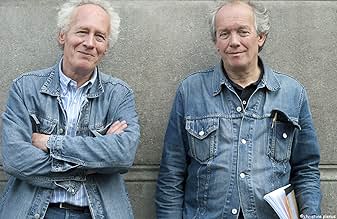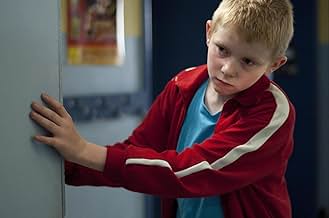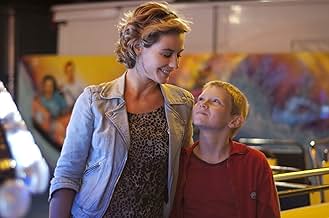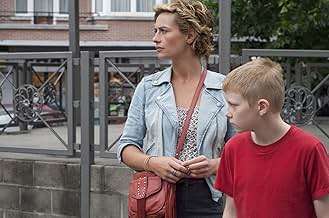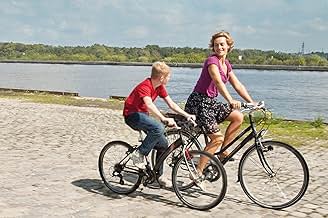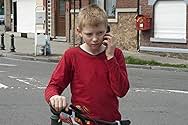IMDb-BEWERTUNG
7,4/10
29.194
IHRE BEWERTUNG
Von seinem Vater verlassen, wird ein Junge in einem staatlichen Kinderheim untergebracht. In einem überraschenden Akt der Nächstenliebe willigt die Friseurin des Ortes ein, ihn an den Wochen... Alles lesenVon seinem Vater verlassen, wird ein Junge in einem staatlichen Kinderheim untergebracht. In einem überraschenden Akt der Nächstenliebe willigt die Friseurin des Ortes ein, ihn an den Wochenenden bei sich aufzunehmen.Von seinem Vater verlassen, wird ein Junge in einem staatlichen Kinderheim untergebracht. In einem überraschenden Akt der Nächstenliebe willigt die Friseurin des Ortes ein, ihn an den Wochenenden bei sich aufzunehmen.
- Regie
- Drehbuch
- Hauptbesetzung
- Auszeichnungen
- 9 Gewinne & 31 Nominierungen insgesamt
Cécile de France
- Samantha
- (as Cécile De France)
Samuel De Ryck
- Éducateur 2
- (as Samuel De Rijk)
Empfohlene Bewertungen
Greetings again from the darkness. When Guy (Jeremie Renier) states that he can't take care of his son Cyril (Thomas Douret) right now, I felt a rush of anger and disgust. Imagine if you were his 11 year old son hearing those words. Young kids should be able to count on their parents for emotional security above all else. There should be no fear of abandonment ... those are issues no child should be forced to deal with (barring a natural disaster).
The Belgium writer/director team of brothers Jean-Pierre and Luc Dardenne have a history of taking on parenthood and childhood in a head-on manner. Cyril is dumped in an orphanage by his dad, and is convinced that he is just misplaced, not abandoned. So being the fiercely determined kid he is, he re-traces his steps from coffee shops to bars to their old apartment. Cyril is convinced his dad never would have sold his treasured bicycle, no matter how desperate for money he was.
Whatever confusion and hostility that you think Cyril might experience, once he confronts his dad, the filmmakers display it in the rawest possible form. Cyril is a symbol of need, hiding behind a wall of rebellion. A chance encounter with Samantha (Cecile de France) leads to weekend visitations and the start of an awkward quasi-family life for both of them. Cyril tests Samantha and all other authority figures in every possible manner, often to the breaking point.
As a parent, it's easy to spot the vulnerabilities that a child faces before they have the maturity to handle it. We see how easily Cyril falls in with the wrong crowd and how quickly things can get really bad. Luckily for Cyril, Samantha doesn't abandon him. She answers "I don't know" to his question of why she let him stay with her. Although, the filmmakers never let us in on her deepest thoughts, we suspect she was once not all so different than Cyril, and someone stepped up for her.
This film won the Grand Jury Prize at Cannes in 2011 and it's easy to see how. It shows how difficult and messy ordinary life can be, but how often things turn out OK, though rarely perfect. Film lovers will recognize Cecile de France from her many films, including the recent Hereafter and the excellent Mesrine.
The Belgium writer/director team of brothers Jean-Pierre and Luc Dardenne have a history of taking on parenthood and childhood in a head-on manner. Cyril is dumped in an orphanage by his dad, and is convinced that he is just misplaced, not abandoned. So being the fiercely determined kid he is, he re-traces his steps from coffee shops to bars to their old apartment. Cyril is convinced his dad never would have sold his treasured bicycle, no matter how desperate for money he was.
Whatever confusion and hostility that you think Cyril might experience, once he confronts his dad, the filmmakers display it in the rawest possible form. Cyril is a symbol of need, hiding behind a wall of rebellion. A chance encounter with Samantha (Cecile de France) leads to weekend visitations and the start of an awkward quasi-family life for both of them. Cyril tests Samantha and all other authority figures in every possible manner, often to the breaking point.
As a parent, it's easy to spot the vulnerabilities that a child faces before they have the maturity to handle it. We see how easily Cyril falls in with the wrong crowd and how quickly things can get really bad. Luckily for Cyril, Samantha doesn't abandon him. She answers "I don't know" to his question of why she let him stay with her. Although, the filmmakers never let us in on her deepest thoughts, we suspect she was once not all so different than Cyril, and someone stepped up for her.
This film won the Grand Jury Prize at Cannes in 2011 and it's easy to see how. It shows how difficult and messy ordinary life can be, but how often things turn out OK, though rarely perfect. Film lovers will recognize Cecile de France from her many films, including the recent Hereafter and the excellent Mesrine.
Cyril, a young boy of about 12, is abandoned by his deadbeat father in the care of some sort of group home. He obsessively tries to reunite with his father, and in the process, falls into the hands of a surrogate mother... and a rather shady surrogate father. The Dardennes aren't straying much from their established style, but there's no reason to. Again, we have a highly effective look at people in emotional crisis and in the grips of moral dilemmas. Throughout the film you're questioning your reactions to things (boy, that Cyril seems like an awful little monster at first) or asking "What would I do?" Again, the camera-work is immediate and unfettered by stylistic flourishes, putting you right inside the lives of these characters. Again, the performances are so natural they feel almost documentary. While I don't think Thomas Doret is as powerful a young actor as Emilie Dequenne in ROSETTA or other Dardenne leads, he does win you over after an unsympathetic start. The movie deals with several parallel themes, the most prominent being one of finding love and acceptance where you can, but it doesn't simply hammer on that one and leaves room for other avenues. I'm not sure yet if I would put this among the best of the Dardennes, but it made a strong first impression.
I recently saw this at the 2012 Palm Springs International Film Festival. This was Belgium's official submission to the Academy Awards for Best Foreign Language Film and won the Grand Prix as the Jury Prize winner at the Cannes film Festival. Cyril Catoul (Thomas Doret) is living in a state run home and school for children after his single parent father Guy Catoul (Jérémie Renier) abandoned him. Cyril's father promised him that he wouldn't sell his beloved bike and when the father never returns to take him from the state care he sets out in search of his father and his bike. A kind single woman, Samantha, (Cécile De France) takes pity on him and tracks down the bicycle that his father had sold and buys it and returns it to Cyril. Samantha soon takes Cyril in to live with her part-time. Cyril is a very troubled young boy and is longing to belong and have a family. He has a temper and is a candidate for a troubled life. From writers/directors/producers the Dardenne brothers, this is a good story with fine acting. I'm sure for the role of Cyril, the directors instructed first time actor Doret, to act like a brat and be who he isn't. It worked well. De France is great as the strong and sympathetic Samantha. The story moves along well with a good score and nice editing. It's a little implausible at times and kind of far-fetched but it's a crowd pleaser and I would give it an 8.0 and recommend it.
"Not everyone can be an orphan." Andre Gide
A kid with only a bike and no mother or active father---now that's a setup for sentiment. Yet the Dardenne brothers have fashioned an unsentimental, realistic drama, The Kid with a Bike, about an 11 year old boy, Cyril (Thomas Doret), who is fortunately taken in by a guardian, town hairdresser Samantha (Cecile De France), but not without serious setbacks that are understandable given his unstable background.
The title evokes thoughts of the famous Italian neo-realist Bicycle Thief, in which a young boy is introduced to life's hard knocks through an imperfect father. In Kid, the father is a deadbeat deserter whose brief appearances are depressing because it's clear a reconnection with his son is not going to happen.
Cyril is running through most of the film, either by bike or foot, a motif signifying his desperate desire for a parent. However blood does not have to be in the loving equation as Samantha becomes a willing surrogate.
No surprise The Boy with the Bike won the Grand Jury Prize at Cannes (2011) and the directors several times before in multiple categories. The humanity rather than the technicality dominates the emotionality; the two principal actors, Doret and De France, are incomparably natural and convincing. Make no mistake, this is a film about a boy, whose character arc the directors fully present. Whether or not he ends up for good through all the turmoil is the pleasure of watching this soon-to-be classic.
You may think again about leaving your child with only his bicycle.
A kid with only a bike and no mother or active father---now that's a setup for sentiment. Yet the Dardenne brothers have fashioned an unsentimental, realistic drama, The Kid with a Bike, about an 11 year old boy, Cyril (Thomas Doret), who is fortunately taken in by a guardian, town hairdresser Samantha (Cecile De France), but not without serious setbacks that are understandable given his unstable background.
The title evokes thoughts of the famous Italian neo-realist Bicycle Thief, in which a young boy is introduced to life's hard knocks through an imperfect father. In Kid, the father is a deadbeat deserter whose brief appearances are depressing because it's clear a reconnection with his son is not going to happen.
Cyril is running through most of the film, either by bike or foot, a motif signifying his desperate desire for a parent. However blood does not have to be in the loving equation as Samantha becomes a willing surrogate.
No surprise The Boy with the Bike won the Grand Jury Prize at Cannes (2011) and the directors several times before in multiple categories. The humanity rather than the technicality dominates the emotionality; the two principal actors, Doret and De France, are incomparably natural and convincing. Make no mistake, this is a film about a boy, whose character arc the directors fully present. Whether or not he ends up for good through all the turmoil is the pleasure of watching this soon-to-be classic.
You may think again about leaving your child with only his bicycle.
The Kid with a Bike (2011)
A troubled boy finds an informal foster mom who tries her best to keep in line. That's the story and in way that's the whole depth of the story. The details—his rebellion, his responding to love, his being suckered by a drug dealer—are expected and interesting and beautifully told. The story has a slightly polished realism to separate it from its forebear, the great classic "The Bicycle Thief," and there might be a slight gap in motivations to explain, but in general you get sucked into this situation and the awkward relationship between the two. It is a tale appreciated in its siimple telling.
I had a foster child for a couple of years at an age close to this boy's, and there is a lot here that makes vivid sense. The woman, perhaps too lovely for normal realism (played by Cecile De France), is nevertheless sincere and quite smart in her mothering skills. She gets the boy to live with her almost by chance, and follows that chance, and learns to give him some rope and to also reign him in by example and through compassion.
But even this isn't enough. That's one of the terrifying truths of being a foster parent (or any parent)—you can only do your best. Some of the result is a product of luck, or personality, or some course of outside events that you don't predict (even if later you can say you saw them coming). All of this is included here, well done, with a kind of filmic modesty.
The one bit of high drama comes down to the child pushing his limits when he gets into a criminal plan, and the results of that, which leads to a bit of small time revenge that goes wrong. The boy is now beyond his own limits and is literally stunned. By the last scene, you ought to be heartbroken but also really hopeful. The message finally is that kids are really resilient, and you have to keep opening the right doors for them and let them make good choices.
This film lets us do that.
A troubled boy finds an informal foster mom who tries her best to keep in line. That's the story and in way that's the whole depth of the story. The details—his rebellion, his responding to love, his being suckered by a drug dealer—are expected and interesting and beautifully told. The story has a slightly polished realism to separate it from its forebear, the great classic "The Bicycle Thief," and there might be a slight gap in motivations to explain, but in general you get sucked into this situation and the awkward relationship between the two. It is a tale appreciated in its siimple telling.
I had a foster child for a couple of years at an age close to this boy's, and there is a lot here that makes vivid sense. The woman, perhaps too lovely for normal realism (played by Cecile De France), is nevertheless sincere and quite smart in her mothering skills. She gets the boy to live with her almost by chance, and follows that chance, and learns to give him some rope and to also reign him in by example and through compassion.
But even this isn't enough. That's one of the terrifying truths of being a foster parent (or any parent)—you can only do your best. Some of the result is a product of luck, or personality, or some course of outside events that you don't predict (even if later you can say you saw them coming). All of this is included here, well done, with a kind of filmic modesty.
The one bit of high drama comes down to the child pushing his limits when he gets into a criminal plan, and the results of that, which leads to a bit of small time revenge that goes wrong. The boy is now beyond his own limits and is literally stunned. By the last scene, you ought to be heartbroken but also really hopeful. The message finally is that kids are really resilient, and you have to keep opening the right doors for them and let them make good choices.
This film lets us do that.
Wusstest du schon
- WissenswertesFor both the moments where Cyril is running from the police and ends up in the doctor's office and the opening scene when he's using the phone and won't let go, the young actor was just instructed by the directors not to give up what the character was doing under any circumstance.
- PatzerWhen the hairdresser is leaving the orphanage after she returned Cyrill's bike the car she is driving makes the sound of Diesel engine, but in the next scene with the same car the car sounds like it has a petrol engine.
- Zitate
Guy Catoul: It's too much. I can't look after him.
- VerbindungenFeatured in At the Movies: Cannes Film Festival 2011 (2011)
- SoundtracksAdagio un poco mosso
from Piano Concerto No. 5, Op. 73
written by Ludwig van Beethoven
performed by Alfred Brendel and the London Philharmonic Orchestra
conducted by Bernard Haitink
Top-Auswahl
Melde dich zum Bewerten an und greife auf die Watchlist für personalisierte Empfehlungen zu.
- How long is The Kid with a Bike?Powered by Alexa
Details
- Erscheinungsdatum
- Herkunftsländer
- Offizielle Standorte
- Sprache
- Auch bekannt als
- The Kid with a Bike
- Drehorte
- Produktionsfirmen
- Weitere beteiligte Unternehmen bei IMDbPro anzeigen
Box Office
- Bruttoertrag in den USA und Kanada
- 1.470.000 $
- Eröffnungswochenende in den USA und in Kanada
- 45.933 $
- 18. März 2012
- Weltweiter Bruttoertrag
- 7.182.147 $
- Laufzeit
- 1 Std. 27 Min.(87 min)
- Farbe
- Sound-Mix
- Seitenverhältnis
- 1.85 : 1
Zu dieser Seite beitragen
Bearbeitung vorschlagen oder fehlenden Inhalt hinzufügen


